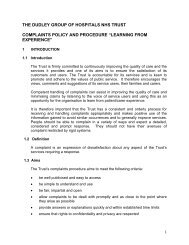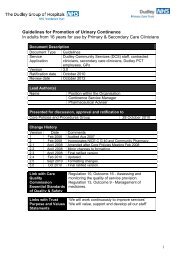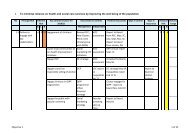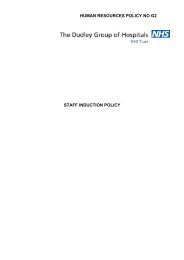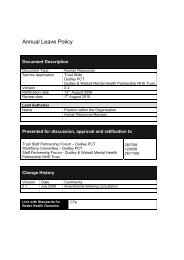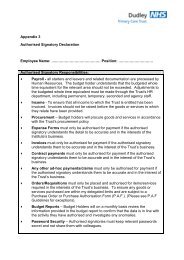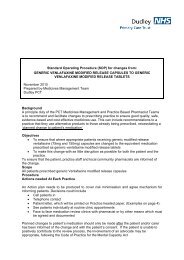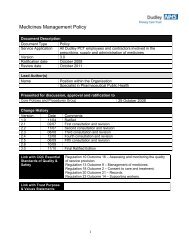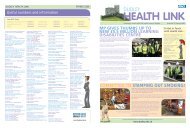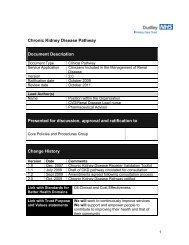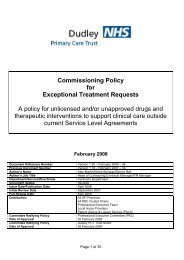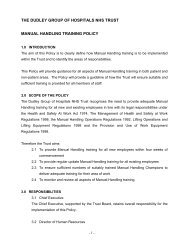Dudley Strategy for Tackling Health Inequalities 2010-15
Dudley Strategy for Tackling Health Inequalities 2010-15
Dudley Strategy for Tackling Health Inequalities 2010-15
- No tags were found...
You also want an ePaper? Increase the reach of your titles
YUMPU automatically turns print PDFs into web optimized ePapers that Google loves.
8.5 VOLUNTEERS, HEALTH CHAMPIONS AND HEALTH TRAINERSThe recent Marmot Review (<strong>2010</strong>) puts empowerment of individuals andcommunities at the centre of action to reduce health inequalities. In doing so, it setsout a vision of “creating conditions <strong>for</strong> individuals to take control of their own lives.”The Community <strong>Health</strong> Improvement team (Public <strong>Health</strong>) in collaboration with<strong>Dudley</strong> Metropolitan Borough Council (DMBC) and the Voluntary and CommunityFaith Sector (VCFS) are working to address health inequalities through an approachwhich engages and empowers people from local communities to develop theconfidence, knowledge, skills and awareness to improve their own health and wellbeing as well as to influence the health and well being of others within theircommunity.Communities as geographical areas, or as collectives of people living in the sameplace or sharing a common identity, can influence an individual‟s health in a numberof ways, and it is often the negative impacts which are highlighted (e.g. levels ofcrime and anti-social behaviour resulting in people not feeling safe to go out andexercise). However, the impact of „word of mouth‟ health in<strong>for</strong>mation, challenges tocommonly held beliefs and misconceptions, „support from next door‟, and themodelling and normalisation of healthy lifestyle behaviours can also directly impacton and positively influence the health and wellbeing of individuals in a way that healthprofessionals are not able to.By harnessing this potential, raising health aspirations and supporting local people tomake a difference in the heart of their communities, Community <strong>Health</strong> Champions,Public <strong>Health</strong> Volunteers and <strong>Health</strong> Trainers can give individuals the in<strong>for</strong>mation,support and motivation they need to make healthier choices and sustain healthierlifestyles.Through the Community <strong>Health</strong> Champions (CHC) programme local people areengaged and motivated to learn about and change their own health behaviours, andthen supported as volunteers to empower and influence their friends, families,neighbours, work colleagues and the wider community.Community <strong>Health</strong> Champions can be recruited through workplaces or may be local„community activists‟ who are identified through well established groups. However,the main focus is on engaging individuals from the most deprived communities orgroups experiencing health inequalities. In this case, initial engagement may typicallyoccur through community engagement activities, such as Arts in <strong>Health</strong> projects,which enable people to get involved in creative and non-threatening activities, andconsequently establish and build trusting relationships, build their confidence andself-esteem and raise their health aspirations. In addition to raising their ownawareness, these projects enable the community to identify local needs or keyissues, which can then in<strong>for</strong>m service redesign and commissioning decisions. Bysupporting participants to become Community <strong>Health</strong> Champions, the projectbecomes sustainable, as key messages and support ripple out into the communitybeyond the duration of the initial project.192



